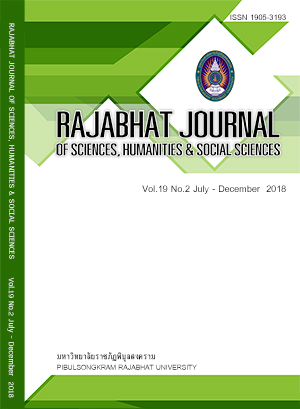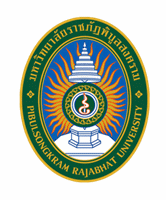EFFECTS OF COOKING ON ANTIOXIDANT PROPERTIES IN BLACK GLUTINOUS RICE (ORYZA SATIVA L. CV. SHAW MAI PAI 49)
EFFECTS OF COOKING ON ANTIOXIDANT PROPERTIES IN BLACK GLUTINOUS RICE (ORYZA SATIVA L. CV. SHAW MAI PAI 49)
Keywords:
Black glutinous rice (Oryza sativa L. cv. Shaw Mai Pai 49), phenolic compound, anthocyanin, cyadinin-3-glucoside, antioxidant, cookingAbstract
This research aimed to study the effects of cooking on antioxidant properties in black glutinous rice (Oryza sativa L. cv. Shaw Mai Pai 49). Phenolic compounds, anthocyanin, cyadinin-3-glucoside and antioxidant activity were examined. This research found that phenolic compound, anthocyanin, cyadinin-3-glucoside and antioxidant activity were 0.27 ± 0.01 mg GAE/100g crude, 46.12 ± 2.24, 57.27 ± 6.00 mg/l and 5.32 ± 0.88 mg/ml, respectively. The antioxidant properties of black glutinous rice changed after cooking in electric cooker for 35 minutes. It was found that the phenolic compound, anthocyanin, cyadinin-3-glucoside and antioxidant activity were 1.30 ± 0.02 mg GAE/100g crude, 33.25 ± 0.52, 9.00 ± 0.40 mg/l and 0.13 ± 0.16 mg/ml, respectively. Cooking affected the antioxidant properties by reducing anthocyanin, cyadinin-3-glucoside whereas total phenolic compounds and antioxidant activity were increased.
References
AOAC. Official Method of Analysis of AOAC International. 17th. USA, 2000.
Chatsuwan N. Relationship between Anthocyanin, Polyphenol Content and Antioxidant Activity in Various Pigmented and Non-Pigmented Rice Cultivars. Master degree Thesis. Faculty of Agroindustry King Mongkut's Institute of Technology Ladkrabang, 2013.
Chitrravimol U. Food Preparation Science. 1st ed. Rajamangala University of Technology Thanyaburi, Pathumthani, 2008.
Giusti MM, Wrolstad RE. Characterization and Measurement of Anthocyanins by UV-Visible Spectroscopy, pp. 19-31. In R.E. Wrolstad, T.E. Acree, E.A. Decker, M.H. Penner, D.S. Reid, S.J. Schwartz, C.F. Shoemaker, D. Smith and P. Sporns, eds. Handbook of Food Analytical Chemistry. Wiley-Interscience, Hoboken, New Jersey, 2005.
Hosseinian FS, Li W, Beta T. Measurement of anthocyanins and other phytochemicals in purple wheat, Journal of Food Chemistry. 2008; 109(4): 916-924.
Kaladee D. Purple Glutinous Rice: The Neglected Thai Rice Resources. Chiangmai Ming Muang Publisher, 2011.
Li W, Pickard MD, Beta T. Effect of thermal processing on antioxidant properties of purple wheat bran, Journal of Food Chemistry. 2007; 104: 1080-1086.
Liyana-Pathirana C, Dexter J, Shahidi F. Antioxidant properties of wheat as affected by Maneecha T, Yingkaew S, Songsamoe S. & Somshong S. Black glutinous rice Salad Cream. 2014. Available at: http:www.kmitl.ac.th/kresearch/?p=379. Accessed February 1, 2014.
Maneechai T, Sukit Y, Sumethee S. et al. Black Glutinous Rice Salad Dressing. Available at: http:www.kmitl.ac.th/kresearch/?p=379. Accessed February 1, 2011.
Naivikul O. Rice: Science and Technology. 2nd ed. Kasetsart University press, Bangkok 2007. pearling. Journal of Agricultural and Food Chemistry. 2006; 54(17): 6177-6184.
Norkaew O, Boontakham P, Dumri K. et al. Effect of post-harvest treatment on bioactive phytochemicals of Thai black rice, Journal of Food Chemistry. 2017; 217: 98-105.
Phetpornpaisan P, Tippayawat P, Michael J. A local Thai cultivar glutinous black rice bran: A source of functional compounds in immunomodulation, cell viability and collagen synthesis, and matrix metalloproteinase-2 and -9 inhibition, Journal of Functional Foods. 2014; 7: 650-661.
Rice Department. Black Glutinous Rice (Oryza sativa L. cv. Shaw Mai Pai). 2013. Available at: https://www.ricethailand.go.th. Accessed November 12, 2013.
Sompong R, Siebenhandl-Ehn S, Linsberger-Martin G. et al. Physicochemical and antioxidative properties of red and black rice varieties from Thailand, China and Sri Lanka, Journal of Food Chemistry. 2011; 124: 132–140.
Downloads
Published
How to Cite
Issue
Section
License
Each article is copyrighted © by its author(s) and is published under license from the author(s).










